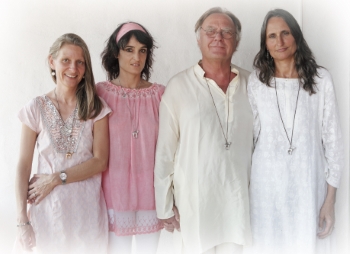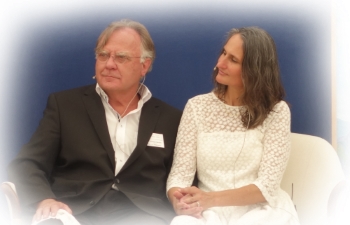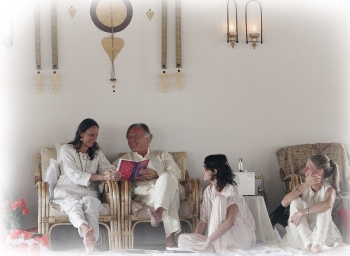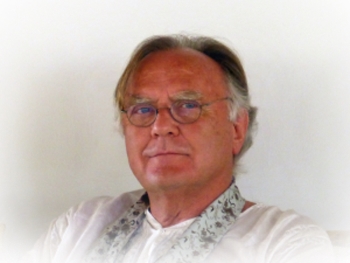Samuel Widmer Nicolet
"There is probably no category anymore in which we can be classified, with our way of living, of working, with our way of being; therefore many people are probably afraid of us, have a problem with us."
This is what Samuel Widmer Nicolet said to his former editor about his own nature and that of the movement to which he belonged.
Samuel Widmer Nicolet, Swiss specialist for psychiatry and psychotherapy FMH – born 24.12.1948 in Zuchwil (Switzerland), died 18.1.2017 in Nennigkofen (Switzerland) – was in fact difficult to classify. He was a gifted psychotherapist, an outstanding spiritual teacher, author – an extraordinary person. And above all, he was a lover.

He worked as a doctor and psychiatrist in his own practice in Lüsslingen-Nennigkofen, a Swiss village near Solothurn. Together with his wife Danièle Nicolet Widmer, he also conducted psychotherapeutic-spiritual workshops, meditation, Tantra and community-making seminars. His spiritual teachers were mainly Jiddu Krishnamurti and Carlos Castaneda’s Don Juan Matus.
He was personally involved with three women – Danièle Nicolet Widmer, Marianne Principi and Romina Mossi – and had a total of eleven children. From the common commitment of Samuel and Danièle Widmer Nicolet to the inter-connectedness of psychotherapy and psycholytic work with the tantric way, the Kirschblüte (Cherry Blossom) community developed and blossomed. Today, the growing community comprises about 120 adults and 80 children.
His work and teaching
Psycholysis
Psycholysis is a psychotherapeutic procedure that involves the application of so-called consciousness-expanding substances. Psycholysis first of all helps to understand oneself and finally, in this understanding, to go beyond one's personal space.
The core is the self-awareness and the experience that we, like everything else, are made of love. Psycholysis invites us to experience oneness with all beings and the universal existence.
Samuel Widmer Nicolet, as a doctor and psychiatrist, had probably the greatest experience in Europe, if not worldwide, in the use of psycholytic substances, both in psychotherapy and in the process of spiritual awakening. He had a special permission (1988-1993) from Swiss authorities to perform psycholytic psychotherapy with the substances MDMA and LSD. He was a co-founder of the ECBS (European Collegium for Consciousness Studies) and the SÄPT (Swiss Medical Society for Psycholytic Psychotherapy). See also "Until Death Separates Us... / Psycholysis", 2013 (in German: Bis dass der Tod uns scheidet… / Psycholyse, 2013).
For 30 years Samuel Widmer Nicolet has been intensively engaged in psycholysis, which he recognized as one of the most effective ways to heal people and the world from the sickness of love lost.
(more...)
(less...)
Tantra

Samuel Widmer Nicolet referred to Tantra as his life; it encompassed his entire attitude to life, his philosophy of life.
In his teaching, Tantra is understood as the process of awakening and becoming aware that everything is one and made of love. Tantra, like meditation, is a path where one finally becomes aware of every blink of the eye and discovers that it is precisely this comprehensive awareness that essentially constitutes the mood of enlightenment and the warrior. In this way one learns to leave all emotions behind and thus centers oneself more and more in the space of pure perception, of oneness. Tantra is about awakened adult love, about love and boundless compassion. See e.g. "... aware of each blink of the eye / Tantra" (in German: … jedes Lidschlags dir gewahr / Tantra, 2016)
(more...)
(less...)
Community-Making
Samuel Widmer Nicolet saw community-making, as others before him and with him, first of all as a healing process. Even if it is not and must not be a therapy in the narrower sense, in the process of community-making broken people, destroyed relationships and disrupted or corrupted community structures
are healed again. Community-making is therefore closely linked to psychotherapy. But community-making is also, besides Tantra and psycholysis, an outstanding tool for self-knowledge.
In the last 24 years, the interest in self-knowledge has brought together a circle of people around Samuel and Danièle Widmer Nicolet. Out of this has grown a flourishing community: the Kirschblüte (Cherry Blossom) community. Besides the interest in self-knowledge, the Kirschblüte community is immersed in and engaged with the big life questions: about love, relationship, death, spirituality, integrity, liberated sexuality, education, the capacity to be happy and enlightenment. See among others Living Together / Community and Community-Making, 2013.
(more...)
(less...)
The Layer Model
The layer model by Samuel Widmer Nicolet is a description of the inward path taken by every human being who awakens for self-knowledge. It describes the feelings one encounters along this path,
from the outermost layer of adaptation, in which most people live, to the underlying forbidden feelings, such as fear, jealousy, envy and competition. Samuel Widmer Nicolet calls these feelings the defensive feelings, because they avert the vulnerable, painful layer within us. Below the defensive feelings are the suppressed feelings such as powerlessness, helplessness, defenselessness, being abandoned and being excluded. The re-integration of all the rejected and defensive feelings will eventually lead the person to the core of his personality.
See among others Listening into the Heart of Things.
(mehr...)
(weniger...)
 The Energy System
The Energy System
The energy system described by Samuel Widmer Nicolet deals with the different energy levels in the human body. It shows how the primal sexual energy from the pelvis and the energy of the will from the abdomen, once freed from conditioning, can ascend to break through into the common heart.
The compassionate power in the heart and the liberated expression lead to an awakening into the silence and unity of all being.
See also "Looking at the Essence, 1998" (in German: Essenz schauen).
(more...)
(less...)
The Deep Dimensions of Psycholysis
Samuel Widmer Nicolet, in his many years of experience with psycholysis, has identified various dimensions of human and universal consciousness: Past orientation, present orientation and future orientation. This is how he described them:
"In the beginning, only the superficial here and now experience is in the foreground. But soon the personal past comes forward and wants to be worked through. Once this has happened, the deep layers of the past begin to show their collective memories, which also take their toll. Paradoxically, this opens us up to the future dimension of psycholysis. The coming to terms with the collective misery frees us for the vision of the future that psycholysis also gives us. We begin to see what would be possible for man, and that he has the potential to blossom in the paradise of love with all other beings and with equals. This is the area of community-making, of Tantra, and also the political dimension which psycholysis and tantra have and must have. The present too has an additional layer of depth. When the past in the personal and collective is somewhat tidied up, time finally stands still. A quiet perseverance in the eternal moment becomes possible, and thereby a gate opens into eternity, into the universe and into other realities or dream worlds. The area that we associate with shamanism becomes visible. Magical things inexplicable to the mind become possible, such as being one with the universe or travelling with perception in this immeasurable space, but also experiencing paranormal phenomena such as seeing aura etc."
(more...)
(less...)
The Incest Taboo
The incest taboo, the taboo of being able to love each other freely, of being able to live in intimate relationship with each other and to recognize the truth of a unique destiny between you and me, whoever we are and whatever we have to, is still the deepest taboo in our conditioning.
To see this taboo and to take care of its liberation is the task of our time, that which could solve our painful relationship situations, our being entangled with each other and the eternal search for a coming home.
Samuel Widmer Nicolet tried to explain this in his two books "About the Unresolved Love Between Father and Daughter, 3. Edition, 2018" (in German: Von der unerlösten Liebe zwischen Vater und Tochter) and "The Incest Taboo, 2010" (in German: Das Inzesttabu ). For the normally conditioned person, however, this argument is still too frightening and threatening. But a mature psychotherapist faces the task of making this confrontation understandable to society – above all to the experts in the field.
(more...)
(less...)
His Works

As an author, Samuel Widmer Nicolet has published a series of books which encompass a broad field, from psychotherapy, psycholytic therapy, spirituality, philosophy, to tantric life, community and community-making, the warrior path of Don Juan Matus/ Castaneda and poetry.
Listening into the heart of things: The Awakening of Love/ The Undesired Psychotherapy/ On MDMA and LSD, his first book and principal work published in 1989, is a comprehensive description of the path inward, a draft of a complete human image, as it had arisen from the psychotherapeutic procedure and in particular from psycholytic psychotherapy. In 2013 it was reprinted in its seventh German edition. It is available in German, English and Spanish.
His second major work "Looking at the Essence / About resting at the very base of all being – Spirituality Begins in the Pelvis, 1998" (in German:
Essenz Schauen), is a textbook on spirituality, a workbook for the serious spiritual seeker. This book provides a complete view of the world as it has emerged from a study of the totality of our energy body.
In addition to numerous volumes of poetry, the last masterpiece he wrote shortly before his death was a song to love, a Gita for his Indian friends (
The Song of the Blessed One / About Love Infinite, 2017).
The complete list of his works with a detailed description can be found
here, as well as a list of the books in
English and other languages.
